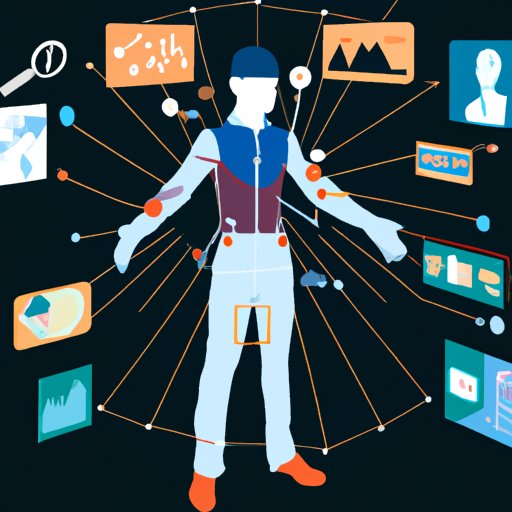Introduction
Health information is data related to a person’s physical and mental health. It includes information about medical history, diagnoses, treatments, medications, and lifestyle habits. Health information can be used to help diagnose and treat illnesses, track health trends, and improve overall patient outcomes.

Examining the Role of Health Information in Improving Patient Outcomes
The use of health information systems has become increasingly important in the healthcare industry as it allows for better communication between patients, providers, and other healthcare professionals. Health information systems are designed to store and organize patient health data, which can be used to inform decisions about treatments and interventions.
Benefits of Using Health Information
Health information systems offer numerous benefits for both patients and providers. For patients, health information systems allow for greater access to their own health records, allowing them to better understand their own health. This increased access can lead to more informed decisions about treatments and interventions, ultimately leading to better care outcomes.
For providers, health information systems allow for improved communication between providers and other members of the healthcare team. This can result in more effective coordination of care, leading to better management of chronic conditions and diseases. Additionally, health information systems can provide valuable insight into a patient’s health by tracking trends over time. This can help providers make more informed decisions about a patient’s care.
Challenges Associated with Health Information Systems
Despite the many potential benefits of health information systems, there are also some challenges associated with their implementation. One of the primary challenges is the cost of implementing and maintaining these systems. Health information systems can be expensive to purchase and maintain, and may require additional training for staff. Additionally, there are privacy and security concerns surrounding the use of health information systems. As health information is highly sensitive, it is important to ensure that systems are secure and that patient data is protected.

Comparing Different Types of Health Information Systems
There are several different types of health information systems that can be used in healthcare. These include electronic health records (EHRs), personal health record (PHR) systems, and clinical decision support systems (CDSS).
Electronic Health Records
Electronic health records (EHRs) are digital versions of traditional paper-based medical records. They are used to store and manage patient health data, including medical history, diagnoses, treatments, medications, and test results. EHRs can be accessed by multiple healthcare providers, allowing for improved communication and coordination of care.
Personal Health Record Systems
Personal health record (PHR) systems are digital records that are maintained by individual patients. Unlike EHRs, PHRs are not typically shared with healthcare providers. Instead, they are used by patients to track and manage their own health information. PHRs can be used to store medical history, medications, allergies, test results, and other health-related information.
Clinical Decision Support Systems
Clinical decision support systems (CDSS) are computer-based systems that are designed to assist healthcare providers in making decisions about patient care. CDSS can provide clinicians with evidence-based recommendations based on patient data, helping them to make more informed decisions about treatments and interventions.
Analyzing the Benefits and Challenges of Using Health Information
The use of health information systems can have both benefits and challenges.
Benefits of Health Information Systems
The use of health information systems offers numerous benefits, including improved communication and coordination of care, better access to patient health records, and improved patient outcomes. Additionally, health information systems can provide valuable insights into a patient’s health, allowing for better management of chronic conditions and diseases.
Challenges of Implementing Health Information Systems
Implementing health information systems can be challenging, as they can be expensive to purchase and maintain. Additionally, there are privacy and security concerns surrounding the use of health information systems, as patient health data is highly sensitive. Furthermore, the use of health information systems may require additional training for staff, which can be time-consuming and costly.

Investigating the Future of Health Information Technology
Health information technology is constantly evolving, and there are several emerging technologies that are expected to have a major impact on the healthcare industry.
Artificial Intelligence and Machine Learning
Artificial intelligence (AI) and machine learning are being used to analyze large amounts of patient data, allowing for more accurate diagnosis and treatment of diseases. Additionally, AI and machine learning can be used to create more personalized treatments and interventions, leading to better patient outcomes.
Wearable Technologies
Wearable technologies such as fitness trackers and smartwatches can be used to collect data about a patient’s health. This data can be used to track health trends, identify potential health problems, and inform decisions about treatments and interventions.
Virtual Reality
Virtual reality (VR) is being used to create immersive experiences that can be used to train healthcare professionals or provide patients with guided relaxation techniques. Additionally, VR can be used to simulate medical procedures, allowing healthcare professionals to practice and perfect their skills.
Conclusion
Health information is an important tool in the healthcare industry, as it allows for better communication between patients, providers, and other healthcare professionals. Health information systems can provide valuable insights into a patient’s health, leading to better management of chronic conditions and diseases. Additionally, emerging technologies such as artificial intelligence and virtual reality are expected to have a major impact on the healthcare industry. Despite the potential benefits of health information systems, there are also some challenges associated with their implementation, including cost, privacy, and security concerns.
(Note: Is this article not meeting your expectations? Do you have knowledge or insights to share? Unlock new opportunities and expand your reach by joining our authors team. Click Registration to join us and share your expertise with our readers.)
